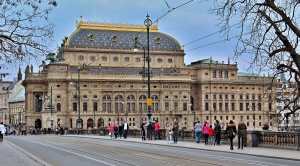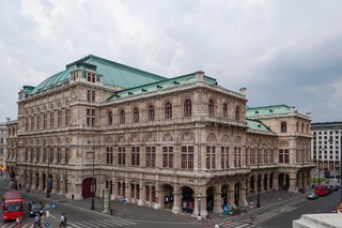
Antonin Dvorak (1841 – 1904) was born 15 miles north of Prague in Nelahozeves, a small village dominated by a large renaissance palace belonging to the Lobkowitz Family.


Antonin’s mother, Anna, was the daughter of a steward of the Lobkowitz estate, while his father was a prominent member of the local community, being the butcher and the local inn-keeper. The steward must have had plenty of business with the local butcher! Father was also zither-player in the local dance band. As a young child Antonin played violin in the band. He also sang in the local church choir. The Kantor, Joseph Spitz, proved a good teacher, and Dvorak’s parents had ambitions that Antonin might become such an organist and choir-master. Like Haydn’s parents, they saw their son’s obvious musical ability as a means to social upward mobility. To this end it also was ensured that he learn German, this being the language of the upper echelons of society.
When he was 16 he gained entrance to the Prague Organ School. Apart from training as an organist and developing his composition skills, he played viola in the school’s orchestra. The repertoire was all Germanic, ranging from Beethoven to contemporaries such as Wagner and Liszt. He graduated from the school two years later as second-best student. He applied for a position of church organist, but his application was refused.
While at the organ school, he had also joined Karel Komzak’s Dance Band. This may well have been economic necessity, but it must have been a natural and congenial thing to do, given his upbringing.

Having failed to get a job as church organist, he continued to play with the dance band, playing in restaurants and for balls. When, in 1862, the Czech National Theatre opened in Prague, it was Karel Komzak’s band that became the core of the theatre orchestra, with Dvorak as the principal violist.

While he was playing in the theatre orchestra, Dvorak was privately composing, and in 1871 he left the orchestra to concentrate on his composition. He scraped a living by giving piano lessons, and was very poor for the next 7 years.

In 1874 he married Anna Cermakova and also became a church organist, no doubt to augment his income.
One of his best friends was Johannes Brahms. It was Brahms who, in 1877, wrote a letter to his publisher Simrock in Berlin warmly recommending Dvorak’s music and including, as an example, 10 duets for soprano and piano. Simrock accepted them and commissioned some (the) Slavonic Dances for piano duet, along with the version for orchestra. These received an enthusiastic review in the Berlin Nationalzeitung which brought about an assault on sheet-music shops. Slavonic Dances sold out in days.The unknown Czech composer suddenly became known and performed in concert halls world-wide. He ceased to be a church organist.
Despite his international success, Dvorak felt his music was never really accepted in the German-speaking world. Simrock, for instance, offered him 3,000 marks for his 7th symphony, whereas Brahms would be offered 10,000 marks for a similar work. But he was immensely successful abroad, particularly in England. He received commissions from the Philharmonic Society and the Birmingham and Leeds festivals. He also made friends with Henry and Alfred Littleton who were the owners of the publishers Novello. They offered much better terms than Simrock. Dvorak’s dealings with Simrock suddenly took a turn for the better.

Dvorak was certainly no longer poor. In later life he returned to the country, bought himself a property 30 miles from Prague, and also a summer retreat in the forest where he could ‘enjoy the beauties of God’s nature’.
The Habsburgs and Czech culture
At the time, the Czech Republic was part of the Habsburg Empire. The Emperor Franz Josef was the absolute monarch. Vienna being the main cultural centre, German was the accepted language; indeed Czech culture was suppressed. However, on 20th October 1860 the Emperor issued a decree that absolutism would be abolished; from now on the Czech language and culture should no longer be suppressed.
There was an immediate move to build a new, specifically Czech National Theatre in Prague. When it opened, strangely, given its association with the upsurge in Czech culture, the repertoire of the theatre was entirely German, French and Italian – until 1867. In that year Smetana became the theatre’s principal conductor. He insisted that Slavic composers’ work be strongly represented – so composers such as Glinka, Smetana himself, and later Dvorak and Janacek, became core repertoire of the theatre.
Lobkowitz Family

The Prince Lobkowitz of Dvorak’s time was Ferdinand Josef. He was a prominent industrialist, particularly in the production of sugar. Like his father, he was a patron of the Arts.

It was his father who was Joseph Franz Maximilian Lobkowitz, the important patron of Haydn, and particularly Beethoven. Beethoven dedicated his op.18 quartets and the 3rd, 5th and 6th symphonies to him, along with the ‘Harp’ Quartet, the Triple Concerto and his song-cycle An die Ferne Geliebte. He was an enthusiastic and talented amateur musician with his own private orchestra. He was a founder-member of the Society of the Friends of Music in Vienna (who sponsored the first performance of Haydn’s Creation) and was a director of the Court Theatre.
By 1811 he was in ‘financial difficulties’!
Habsburg throne

Joseph II had been Holy Roman Emperor since 1765, but had shared the Habsburg throne with Empress Maria Theresa. When she died in 1880, Joseph II became sole monarch of the Habsburg Empire.
Josef Hlávka
Josef Hlávka was an architect.

Like Dvorak, he was of humble origins. He studied first in Prague, and then in Vienna. Having completed his studies, he worked in Vienna as a brick-layer for a fellow Czech, František Šebek. When Šebek retired, he left Hlávka his considerable building business.
Hlávka was responsible for several major projects including the Vienna State Opera and a maternity hospital in Prague. He became a man of considerable means, and a major patron of the Arts. His substantial financial support enabled the foundation of The Czech Academy of Science and the Arts.


He married twice, but both his wives died young, leaving him no heirs. So when he died he left his entire fortune to the educational and cultural charities he had established.
His importance and generosity was such that 2008, the 100th anniversary of his death, was declared as a UNESCO World Cultural Anniversary.
Mass in D – Antonin Dvorak
The Mass in D is unique among Dvorak’s religious works in that it was not composed for concert performance.
This somewhat intimate piece was composed in 1887 for Josef Hlávka who had built himself a private chapel. He commissioned it for the consecration of this chapel.

The original version was accompanied by the organ. At this time Dvorak was much involved in English musical life, and in 1892 his English publisher, Novello, asked him to orchestrate it. In our May 2022 concert we performed the Mass in its original form.
